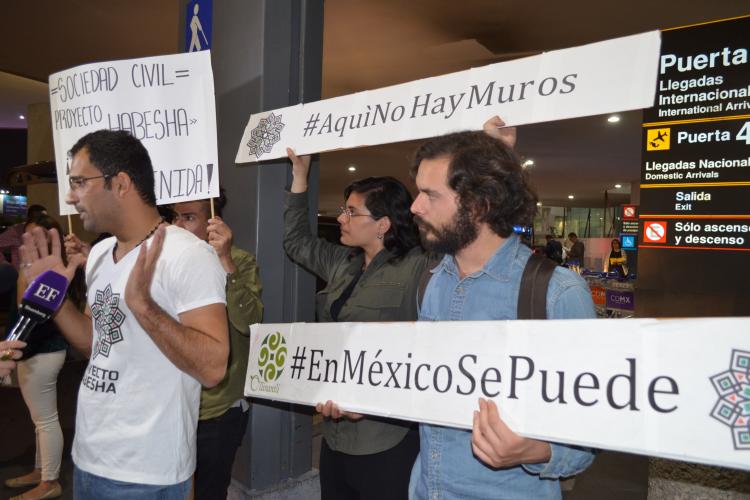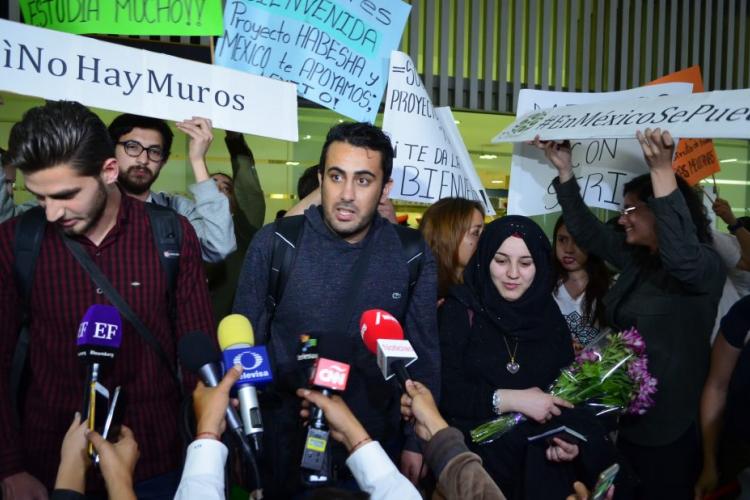Guest post by Sonja Wolf. Sonja holds a PhD in International Politics and is a CONACYT Research Fellow with the Drug Policy Programme at the Centro de Investigación y Docencia Económicas (CIDE) in Mexico. She is the author of Mano Dura: The Politics of Gang Control in El Salvador (University of Texas Press, 2017). Sonja is on Twitter @scwolf5.
The global refugee regime has traditionally understood refuge as a humanitarian issue. The focus has rested on providing refugees, chiefly those housed in camps, with shelter, food, and clothing until they could return home. Increasingly, the international community recognises that refuge is also a development issue and vulnerable populations’ autonomy and dignity need to be restored through education and jobs. However, governments around the world (and the publics they are accountable to) consider refugees an economic burden and -especially since the terrorist attacks of 9/11– a security threat. Governments are therefore reluctant to collaborate effectively in offering refugees protection and finding durable solutions to their plight. Intractable conflicts often prevent repatriation to the country of origin within a reasonable period, yet the number of resettlement places in third countries is dwindling, and most refugee-hosting countries refuse to consider permanent local integration.
Interest in education in emergencies began to grow with the onset of the Syrian conflict. Educational opportunities are meant to reduce the vulnerabilities of refugee children and youth to economic exploitation and recruitment by armed groups, while also contributing to post-conflict peacebuilding and reconstruction. Support for primary and secondary education has, however, vastly outstripped that for tertiary education. Prior to the outbreak of the war, Syrians were ranked among the most educated populations in the Middle East. UNESCO data indicate that in 2011, 26 percent of the country’s university-age citizens were enrolled in higher education. The deepening violence interrupted their studies, but many young Syrians hoped to continue their education abroad. Visa requirements and limited scholarships, however, often extinguish these dreams. At the global level, only one percent of eligible refugees can enrol in a university. Civil society actors are stepping in to help meet these educational needs through scholarship programmes. As the experience of the Habesha Project shows, adequate maintenance and psychosocial support must complement the educational process.

Habesha is a Mexican non-profit initiative that, since 2014, has been working to bring young Syrian refugees to Mexico to allow them to finish their higher education. Adrián Meléndez, a humanitarian worker, created the programme at the height of the Syrian conflict with three objectives in mind: provide 30 refugee students with university scholarships and maintenance grants; foster refugee integration through intercultural dialogue; and promote a philanthropic culture in Mexico through citizen donations. 15 individuals have since 2015 joined Habesha, although three of them have since dropped out. The students, selected based on academic commitment and civic engagement, are mostly men in their twenties who fled violence, forced conscription and/or economic hardship in their native Syria. As camp or urban refugees in Iraq, Lebanon or Turkey they experienced discrimination and made ends meet through informal labour. Habesha meant for them an invaluable –often the only– opportunity to escape life as refugee. The students spend their first year studying Spanish in Meléndez’s hometown of Aguascalientes, before starting their undergraduate or postgraduate degree, generally in another city.
Habesha goes to great lengths to obtain visas, arrange travels, secure scholarships, and help the students settle in. But its operations have been difficult to sustain. Without an ongoing fundraising strategy since its inception, the NGO has largely relied on voluntary contributions to cover salaries, stipends, and other costs. Gathering the necessary funds has proved tricky in a country where charitable giving is not the norm. The National Survey on Philanthropy and Civil Society (ENAFI), last conducted by the Autonomous Technological Institute of Mexico (ITAM) in 2013, showed that 96 percent of respondents had not donated to a humanitarian organisation in the year prior to the poll. Habesha tries to involve the students in promotional and fundraising activities in the hope that their testimonies will help kindle compassion and generosity towards refugees. But this has met with some resistance from the Syrians who prefer not to be associated with a stigmatised identity and the painful memories that accompany it.
The resource limitations have important implications for both the agency and the students. First, they make it challenging to recruit and retain qualified staff. The small team headed by Meléndez comprises recent graduates who are prepared to work long and stressful hours for little or no pay in return for professional experience in the non-profit sector. Second, the modest maintenance grants have come as a disappointment to the beneficiaries, who had expected a more comfortable life as foreign students, and are a source of constant friction. Third, the reliance on honorary aides for administrative and teaching support is problematic in a country with low levels of volunteering. The ENAFI of 2013 indicated that 82 percent of respondents had not been volunteers in the year before the survey. Habesha volunteers, often university students, tend to commit to short periods of time. The uneven quality of the teaching and interruptions of the language classes compromise the Syrians’ ability to commence their degrees in a timely manner. The stories of the Habesha students reveal how lax applicant screening and financial restrictions can impact academic performance and mental health.

As scholarship recipients, Habesha students must maintain a certain grade point average throughout their career. Samira, a pious Muslim woman living by herself for the first time in her life, had adjustment difficulties during her first year of odontology. Impressed with her dedication to learning, the college decided, as an exception, not to withdraw the award. Other cases have been less encouraging. Adnan, a top student in his country with a degree in French literature, withdrew from two programmes of study after struggling with low frustration tolerance. He now tries to keep afloat with translations and Arabic classes while awaiting refugee status determination. Tarek, at 31 years the oldest of the cohort, had intermittently studied Economics in Syria and worked odd jobs from a young age to support his family. In Mexico he made two unsuccessful attempts to gain a BA in Communication Studies. Casual work, Spanish language difficulties, and his age hampered his ability to readjust to student life in a different educational setting. These contrasting experiences point to the need to screen applicants for emotional intelligence, ensure they have clear academic goals, and provide them with an adequate stipend.
Scholarship programmes also need to carefully manage the expectations of refugee students and to offer mental health support that helps them deal with the trauma of displacement. Imran, the first Habesha student, abandoned his postgraduate course after experiencing psychosis and returned to war-torn Syria where his current fate is unknown. Tarek suffered recurrent nightmares and, after leaving Habesha, struggled to find work and housing. His expired passport complicates a return to Syria, and faced with mounting disorientation, despair, and suicidal thoughts, he fell back into using and dealing drugs. The stories of Imran and Tarek raise urgent questions for refugee protection and assistance. What ethical responsibilities does a humanitarian organisation have to help refugee students “arrive” in the host country physically and psychologically? What is the appropriate role of private providers when governments are shunning their obligations towards refugees? How sensible is it to bring a small number of refugee students to a third country, rather than addressing the needs of larger refugee populations in refugee-receiving countries? Habesha has managed to establish itself and gain credibility as a small but innovative humanitarian actor. UNHCR, for example, has now granted the organisation funding to replicate its scholarship programme with Central American refugees in Mexico. The example of Habesha, however, also underscores the need for ways of better serving the refugee population as a whole, not just the privileged few who survived their displacement relatively unscathed.
Note: The names of the students were changed to protect their privacy.
Any comments about this post? Get in touch with us! Send us an email, or post a comment here or on Facebook. You can also tweet us.
__________
How to cite this blog post (Harvard style)
Wolf, S. (2019) The Limits of Solidarity: Refugee Dislocations and Assistance. Available at: https://www.law.ox.ac.uk/research-subject-groups/centre-criminology/centreborder-criminologies/blog/2019/06/limits-solidarity (Accessed [date])
Share:








